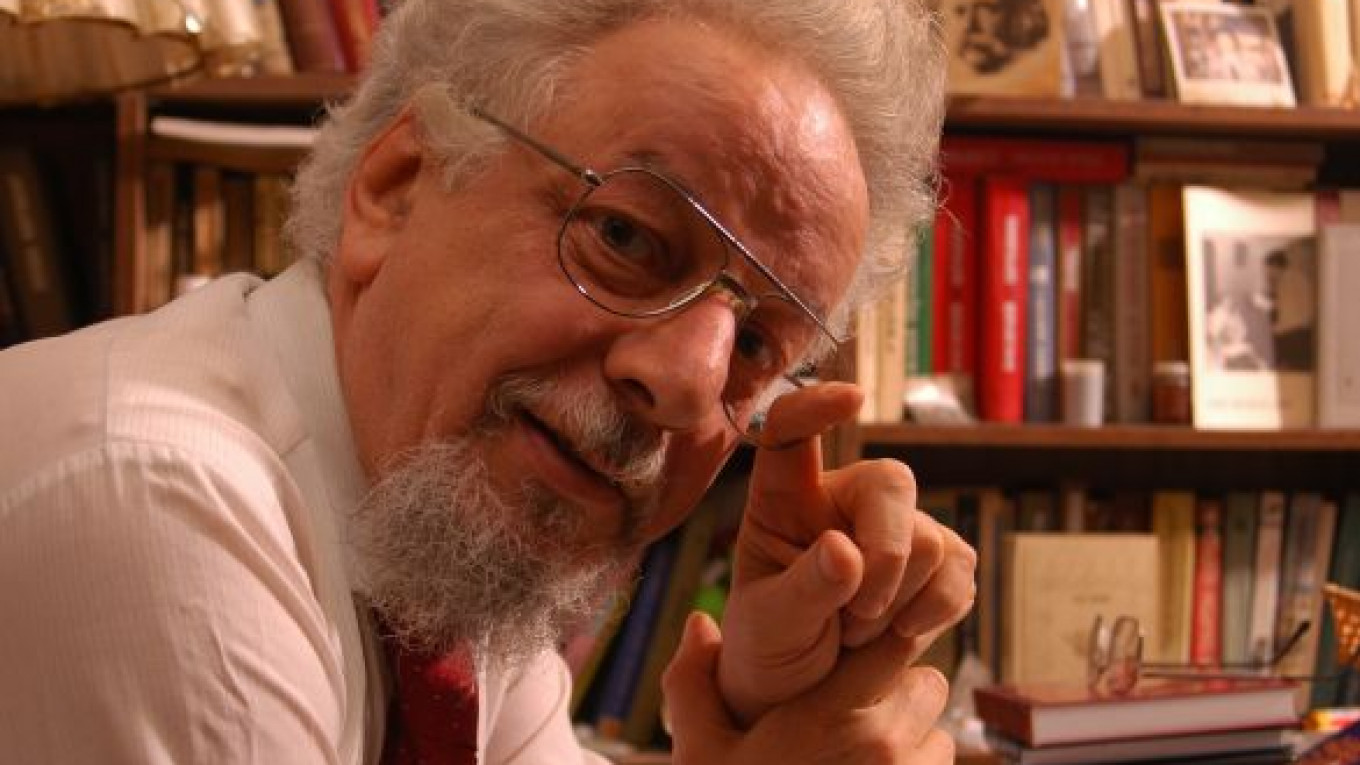Type a letter, find a soulmate, become part of a society of good samaritans. Save the world.
A global "pay it forward" movement for spreading around good deeds has launched from what appears as the most unlikely place of all — a small and understaffed typing office in cloud covered Moscow. The idea is that once people learn how to type and communicate using the Internet, then they can connect to common minded folks on the business website's social network.
"Everybody thinks that [Mark] Zuckerberg invented something great — a social network. It's not a social network! Why are we lying? It's a telephone book," said the society's founder Vladimir Shakhidzhanyan. "We want to unite people of the world so that we can all help each other in our development and improve our lives in this world."
Shakhidzhanyan, 73, is a Moscow State University journalism professor and book author who became famous in the 1990s for writing a manual about sex. An eccentric radical of his time, he describes himself as impatient, selfish, ambitious and "incapable of dying from shyness."
At first glance, his computer program "Solo on the Keyboard" is a basic typing resource, but those curious enough to dig deeper will find that the typing courses are just a means to join what Shakhidzhanyan hopes will be a global social network for kind, helpful and tolerant people.
The network will be a place where people will overlook common communication barriers, such as race, age, nationality, religious and sexual differences, and engage in open-minded discussions. It could also serve as a meeting hub, though Shakhidzhanyan stressed that it is not a dating website.
The society will operate according to the "pay it forward" principle. That is, somebody does something nice for you but instead of returning the favor, you do a nice gesture for someone else.
"Try to live without forgetting this principle," Shakhidzhanyan said. "Ask yourself often what and to whom you can offer something, what you can do and how you can help."
Shakhidzhanyan keeps the registered society members motivated by sending them regular e-mails with optimistic pictures — including virtual bouquets of flowers — and life-affirming messages. He calls on people to shift their mood from a routine Moscow traffic jam to the beautiful snow-covered trees outside their car windows and even gives advice on which juices to drink to improve the mood. His mission, he said, is to infect people with optimism.
There are already over 170,000 of them registered on the website and they come from around the world, mostly across Russia and the former Soviet Union, but also as far as the United States, United Kingdom, Argentina and the Ivory Coast.
The website already has sections in English, Italian, German, French, Spanish and Polish, and the organizers plan to expand this language base to make the society even more international.
When people first fill out their profiles on the website, they are tired, nervous and lack faith, Shakhidzhanyan said. In Russia, in particular, people have become indifferent because they have stopped believing in the good of others and are lonely. But even the most dejected people are not turned away.
"Each person is an individual. Each person deserves respect," Shakhidzhanyan said.
He addresses all his employees and students by their name and patronymic, and tries to make them more confident human beings. The ultimate goal is to create a society where people would readily respond to the requests of strangers, such as bailing a fellow member's car out of a traffic accident or sharing a children's language textbook.
Not all those registered on the website are helping to make this vision a reality and Shakhidzhanyan's team has already deleted some inactive members from the society.
"Doklikhi," as Shakhidzhanyan calls them, are people who registered on the site but don't take any typing lessons or participate in the discussions. In his outspoken manner, Shakhidzhanyan quizzically asked whether he should spank them to get them out of their slumber.
Shakhidzhanyan himself gets giddy at the prospect of doing nice gestures for others. Rather than giving gifts on the usual holidays, he prefers the element of surprise.
Giving the interview at a cafeteria in his office building, he noticed that the cook does not have enough teapots to hand out to all the customers during the lunch rush. Promptly he dispatched one of his workers to buy two china teapots from the nearby shopping center and pass them on to the kitchen staff. However, he did not stay behind to hear the cook's reaction.
"It is necessary to always remember the good that was done by others," he said earlier. "But it is not necessary at all to remember that you did something good for others. You did something good — let it go. That's the way to live!"
You can register on the social network at
Contact the author at [email protected]
A Message from The Moscow Times:
Dear readers,
We are facing unprecedented challenges. Russia's Prosecutor General's Office has designated The Moscow Times as an "undesirable" organization, criminalizing our work and putting our staff at risk of prosecution. This follows our earlier unjust labeling as a "foreign agent."
These actions are direct attempts to silence independent journalism in Russia. The authorities claim our work "discredits the decisions of the Russian leadership." We see things differently: we strive to provide accurate, unbiased reporting on Russia.
We, the journalists of The Moscow Times, refuse to be silenced. But to continue our work, we need your help.
Your support, no matter how small, makes a world of difference. If you can, please support us monthly starting from just $2. It's quick to set up, and every contribution makes a significant impact.
By supporting The Moscow Times, you're defending open, independent journalism in the face of repression. Thank you for standing with us.
Remind me later.






